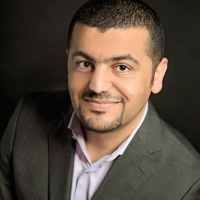ISIS: Inside the Army of Terror
Hassan Hassan, co-author of ISIS: Inside the Army of Terror, Middle East analyst, and columnist for The National, discussed the roots and development of ISIS and its future in the Middle East.
On March 12, 2015, the Middle East Program at the Woodrow Wilson Center hosted an event, “ISIS: Inside the Army of Terror” with Hassan. Haleh Esfandiari, Director of the Middle East Program at the Woodrow Wilson Center, moderated the event.
Hassan started by highlighting three historical snapshots that help explain the emergence and expansion of ISIS: the 1990s, the Iraq war, and the Arab Spring. In the 1990s Saddam Hussein launched a faith campaign which encouraged the Islamization of Ba’athism. Hassan said this fusion between Ba’athism and Salafism is still relevant to what ISIS represents today. Another significant development in the 1990s was the Iraqi government’s creation of an underground financial network to circumvent the U.S.-imposed sanctions. These same kinds of networks are currently used by ISIS to survive in the black market.
The second defining moment for ISIS, the Iraq war, caused Sunnis to feel threatened and consequently triggered a movement to restore Sunni control. The war also encouraged the alliance between Ba’athi forces and Salafis, who were both fighting for local Sunni communities. Abu Musab Al-Zarqawi, the former head of al-Qaeda in Iraq who rose to prominence during the Iraq war, held different ideological beliefs than Osama bin Laden. Hassan explained that the differences between these two figures shaped and defined the current differences between ISIS and al-Qaeda. Al-Qaeda (and later al-Nusra Front in Syria) sees the West as the enemy and perceives its role as providing an example to encourage Muslims to fight the United States. On the other hand, Zarqawi (and later on ISIS) focused more on the Shi’a—whom he regarded as the enemy from within. According to Hassan, Zarqawi introduced the added ingredient of sectarianism to the Ba’athism and Salafism mix, which created a “triangle of terror.”
Finally, Hassan argued that the Arab Spring benefited ISIS because it provided the organization with many opportunities to fill the power vacuum and create an actual state. ISIS applied all its skills to impose itself as a reality on the ground. It made use of the Arab Spring’s youth revolt against the political and religious elite and presented itself as opposing both. ISIS is anti-clerical, rejects intellectual monopoly, and roots itself in Islamic history. It is immune to moderate discourse because it bases the justifications of its actions on precedents by early Muslim generations. This is why it is almost too late, according to Hassan, to convince someone to leave ISIS after they have already adopted its ideology and beliefs.
In the question and answer portion of the event, Hassan confirmed that ISIS is both a political and a religious project thriving on weak states and a narrow understanding of religion. On the topic of the barbaric treatment of women, Hassan affirmed that ISIS turns to obscure incidents in Islamic history to justify abhorrent actions such as the enslavement of Yazidi women. In response to a question on finances, Hassan clarified that ISIS’s two sources of income are oil and weapon stockpiles. While these two sources are increasingly being curtailed, ISIS survives on local money by acting like a state and charging for services. Hassan regarded Gulf states’ funding of ISIS as a myth, noting these countries see ISIS as more of a threat than the United States or Iran do. According to Hassan, reasons for joining ISIS are diverse and range from pragmatism and youth zealousness to social rivalry and long standing radicalism. Regarding the importance of ISIS leader Abu Bakr Al-Baghdadi, Hassan asserted that organizationally speaking, everyone is dispensable in ISIS. The organization has succeeded in establishing itself as an autonomous group with a core that can grow over time.
By: Khadiga Omar, Middle East Program
Speaker

Hosted By

Middle East Program
The Wilson Center’s Middle East Program serves as a crucial resource for the policymaking community and beyond, providing analyses and research that helps inform US foreign policymaking, stimulates public debate, and expands knowledge about issues in the wider Middle East and North Africa (MENA) region. Read more
